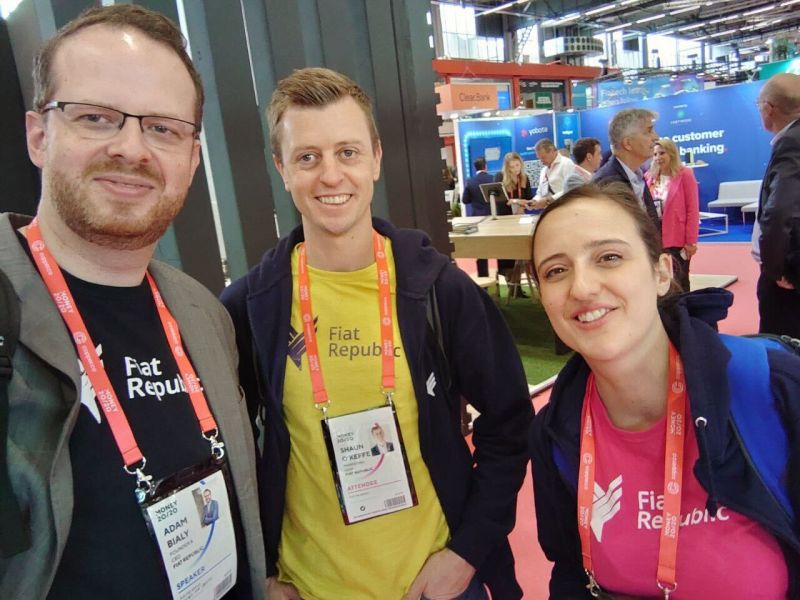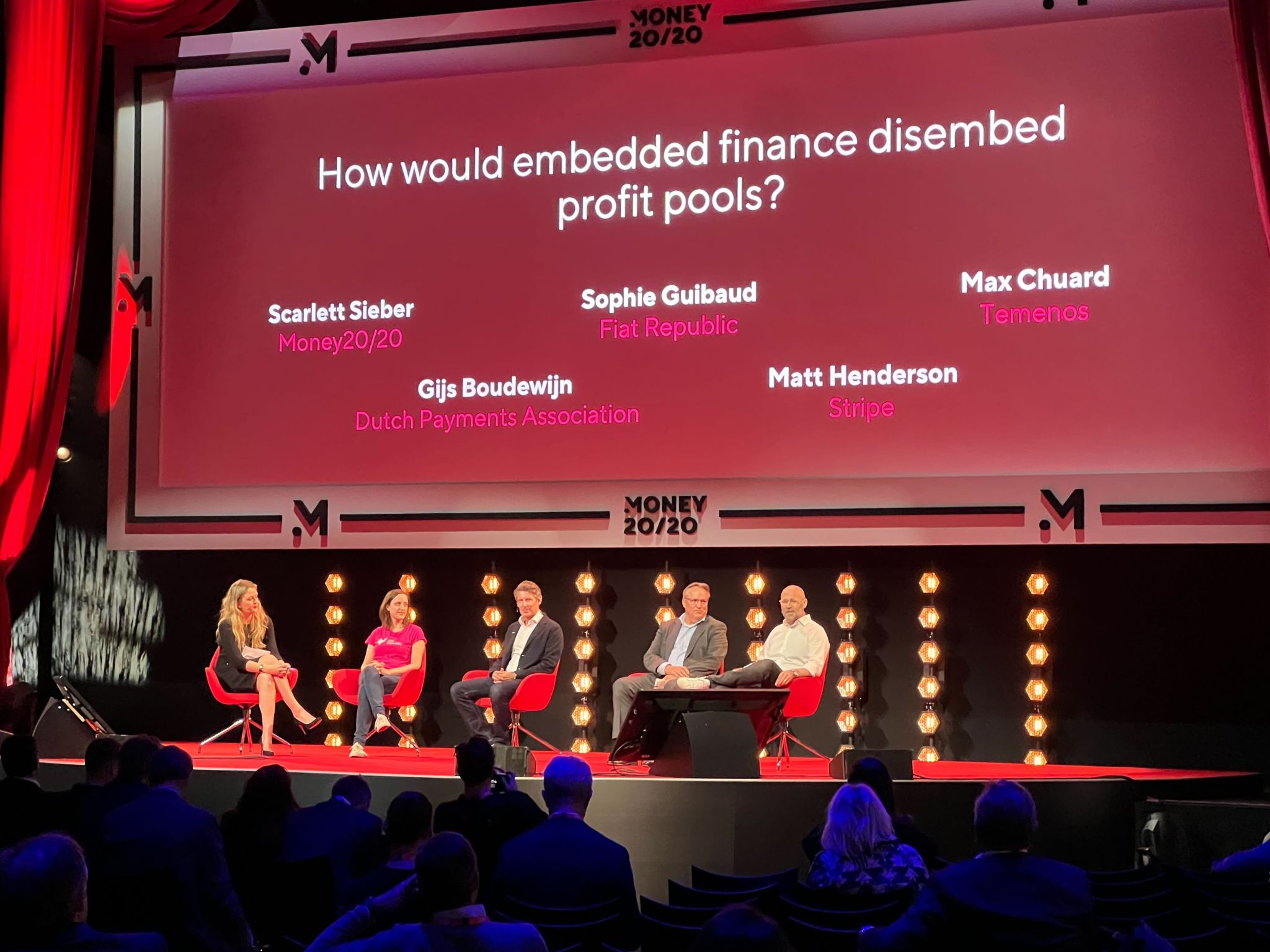Key takeaways from Money 20/20 & Consensus
We pride ourselves on actively engaging with the fintech, bank and crypto communities by attending the events that matter in the community. It was therefore a pleasure to play a leading role at Money20/20 in Amsterdam, sharing our expertise as a Web 2.5 pioneer in bridging banks and crypto and shaping the future of payments for crypto and web3 platforms. As if that wasn't enough, we then got to be at Consensus 2022 in Texas, Austin. With those events being back to back, as you can imagine, that was one of the most intense weeks of 2022!

Our Money 20/20 experience
Money 20/20, Fintech’s biggest conversation, was jam-packed with insights anchored around consumer flexibility, experience and trust. As a Chief Growth and Commercial Officer, I thoroughly enjoyed the many themes around how FinTech firms can bring value in a financial services and payments world that is increasingly complex and fragmented.
Fiat Republic was fortunate to share our ideas on this, with two speaking slots, one book release, a podcast recording and many successful and insightful meetings. Ultimately, two key themes excited me most: Crypto’s maturing and expansion into using fiat to go mainstream and embedded finance’s role in supporting this growth. The speed at which crypto projects move can seem exciting, bridges into traditional networks must be built, not burnt, and crypto-fiat bridges are at the centre of this.
The Fiat Republic team joined forces at Money 20/20
Crypto maturing and expanding into Fiat
Refreshingly, bridging banking and crypto was central to many sessions during the week. Naturally, we at Fiat Republic had our own two cents on the matter. For example, Adam Bialy, our CEO & Founder, joined the Evolution stage on Tuesday, 7 June, to talk about The Collision of Two Ecosystems, how – and why – we are building a bridge between banks and crypto to achieve balance in the ecosystem. With all of crypto’s emphasis on tech, it’s easy to forget about the business and human side of things. Most significantly: Partnerships. Concrete partnerships are based on reliable communications, transparency and mutual understanding. Without the right partnerships, cryptos growing pains will last longer than needed. There is a $1.1 trillion annual fiat-crypto volume with 300 millions crypto users, yet that only represents 4% of the world population. We can be more hungry! To unlock a bigger piece of fiat-crypto pie, we need strong, mutually beneficial, and honest partnerships to enable seamless discussions, rehabilitate trust between banks and crypto, and provide stellar user experiences for the customer.

Embedded finance
Later that day, I joined the big picture stage for a panel discussion on how embedded finance will shift profit pools along the value chain and create new business models, alongside Gijs Boudewijn from Betaalvereniging Nederland (Dutch Payments Association), Matt Henderson from Stripe, Max Chuard from Temenos and (my friend! and) moderator Scarlett Sieber from Money20/20. Embedded finance allows non-financial companies to add financial services to their existing offering, unlocking a new source of revenue, increasing customer stickiness, and accumulating transactional data, which platforms can use to deliver personalised experiences.

Crypto, of course, can have its go at embedded finance and leverage its for the benefits of its growing user base. The past few years have seen crypto exchanges’ addition of fiat payments, cards, and even lending, enabling to increase its reach and supercharge user experience. Launching in new (untouched and underserved) geographies, and unlocking the growth of web3 platforms such as NFT marketplaces is, I believe, the next place to look for embedding finance opportunities in the crypto and web3 space, because the more novel the Crypto or Web 3 product is, the more fiat is needed to bring converts.
And what would embedded finance be without Sex & Drugs & Rock & Roll? Jokes. In all seriousness my dear friend and Co-Author, Chief Strategy & Growth Officer at Money2020, Scarlett Sieber, arranged our very own release party for our book “Embedded Finance” at the Sex & Drugs & Rock & Roll Club, Wednesday 8 June. We had a blast!

What were the key trends and learnings at Money 20/20
- Web 3 has the power to revolutionise everything
If and only if it has direction and seeks to solve real problems. “It all starts with why we’re using this new technology rather than building tech for tech’s sake. During one of Thursday’s panel discussions, it has the power to fundamentally change ownership,” said Seema Khinda Johnson, co-founder & COO, Nuggets at the Planetarium Stage.
We couldn’t agree more. Web 2 (banks) and Web 3 (crypto) need each other. To unlock the remaining 96% of the population, we need to find a trustworthy way to bridge the banks and crypto to remedy poor fiat access. Most solutions today only offer temporary relief and aren’t sustainable. We need a solid overpass that will upgrade fiat access for crypto platforms, eliminating their fiat headaches and unlocking crypto to the masses. We call this Web 2.5 and we have made our mission to build it.
- Central Bank Digital Currencies (CBDCs) are new, but they’re gaining traction
We need a vision of what role they are to play in the crypto landscape. Speaking to this future was an insightful panel on the Project New Era, a Digital Sterling (dSterling) pilot evaluating the future digital currency ecosystem in the UK, focusing on Retail CBDCs.
For example, the potential for maximising inclusion “[CBDC’s can be directed towards] ensuring that digital transformation and innovation has at its heart inclusion because there are so many sectors of our society who are marginalised in the traditional finance industry,” according to said Dr. Lisa Cameron, MP House of Commons.
Another important consideration is the role CBDCs do or ought to play in contradistinction to cryptocurrencies and stablecoins: “CBDCs are meant to be cash-like and be linked to a central bank. Cryptocurrency is not linked to a central bank and […] [stablecoins don’t really have a fixed standard]…[ thus CBDC’s need to be thought about] very, very differently, and they have to be regulated appropriately differently,” Nicole Sandler at Barclays commented.
- Diversifying offerings and providing value-added services
With high inflation, rising interest rates and squeezed balance sheets, the provision of flexible, secure and reliable financial services is ever more crucial. For consumers, choice is crucial: people need to feel in control of their finances and want to connect with financial services intelligently. Similarly, the “how?” – and “when?” – of a financial services usage needs to meet a demand for flexibility and a user-friendly experience.
A few exciting sessions looked at what payments providers can do to diversify their offerings and which value-add services make the most sense to build their customer base. For instance, the 11:FS talk emphasised that an innovation wake-up call is on the horizon, with payments providers needing to balance their risk appetite with innovation as issues like security and platform resilience grow in importance.
Our Consensus experience
What were the key trends and learnings at Consensus 2022?
- The regulatory landscape leaves a lot to be desired
The US, for example, has only just seen the bipartisan crypto bill (“Responsible Financial Innovation Act”) introduced in the United States Senate on June 7, 2022. Whilst there are 50 other crypto bills that have been introduced in Congress, it will likely take some deal of time before we see systematic change (good or bad) reflected in the US.
- There is a Cult in Culture: and that’s not always a bad thing
One unconventional take from Meltem Demirors, Chief Strategy Officer of CoinShares, was a keynote on how the crypto community is creating shared identity, belief systems and lifestyle rituals around emerging projects. Although cults can have a negative connotation, the message behind the presentation specifically regarded one’s process of developing meaning in life… After all, as my colleague Emily Harris, Fiat Republic’s Head of Compliance, said, there is a “Cult” in “Culture”, and the crypto community is most definitely creating a whole new culture with already 300 millions converts.
- The frosty bear season is an opportunity
Building an ecosystem in current market circumstances provides a few obstacles, yet we ran out of fingers and toes counting the number of positive initiatives and optimistic attendees. And while the crypto space continues to attract, Staci Warden, CEO of the Algorand Foundation, viewed this slightly frostier season as an opportunity for building. “We think that there will be some shakeout in the industry, and we are ready to innovate”. And so does the Fiat Republic team!
How can Fiat Republic help?
- We agree that Web 3 has the power to revolutionise the world but…
- This needs to be done in tandem with banks and regulators and with a compliance-first approach
- The bear season is an opportunity for builders: we need to join forces together, keep building, and developing strong relationships within the ecosystem. Ultimately it’s a win-win-win for crypto platforms, their users, and the traditional players
To unlock the revolution we need to find ways of bridging banking with crypto. Fiat Republic’s API doesn’t just aggregate crypto-friendly banking services; it allows you to launch a fiat bridge in days, whether it is for banking redundancy in existing geographies or launch in new ones. This way, you can revolutionise at speed without compromising unlocking global and local fiat rails in a secure and scalable way.
Unleashing crypto requires compliance, AML and full transparency into transactional history: otherwise banks and regulators will remain uncomfortable. We enable you to reduce the number of payments held in compliance review and ultimately streamline your payments operations. Secondly, transparency and trust are the alpha and omega. It’s therefore a crucial feature to be compliant from the get-go to minimise the risk of debanking, which our compliance-led data architecture and supportive team of payments experts offer.
The Fiat Republic Consortium serves as the third and final step to unlocking crypto to the masses to streamlining communications between all stakeholders. The consortium is the unified voice for crypto platforms, bringing them together to amass collective bargaining power with banks and regulators . Ultimately, we believe in the ability to foster wider business opportunities within members of the Consortium and that it will benefit the whole ecosystem.
Fiat Republic has set out to democratise fiat access for the Web 3 economy – and watch our words, we will make it happen!



